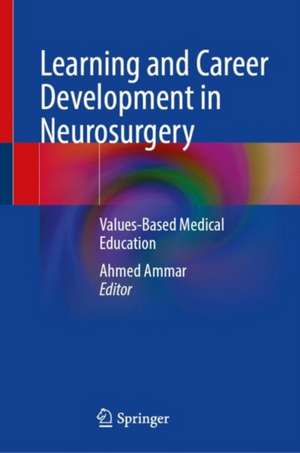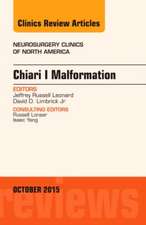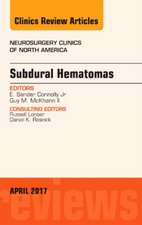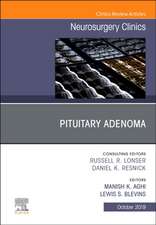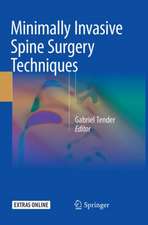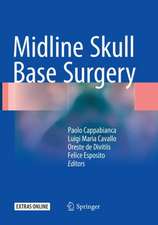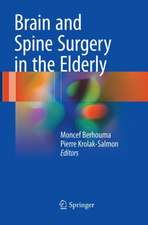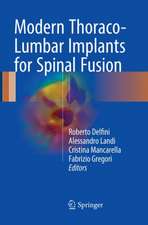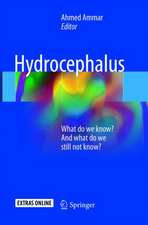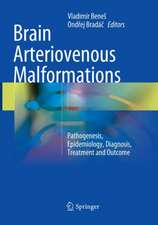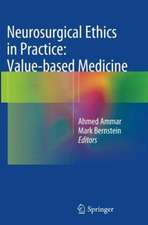Learning and Career Development in Neurosurgery: Values-Based Medical Education
Editat de Ahmed Ammaren Limba Engleză Hardback – 25 sep 2022
Metacognition is thinking about one’s thinking, to plan, monitor and assess one’s understanding and performance. By adherence to medical ethics and Values-Based Medicine (VsBM) as guiding principles, we can develop benevolent medical practice. To enhance knowledge application, skills, and character qualities in realms beyond the immediate context in which they were learned.
In this book, we developed a framework on how to evolve medical education and training by utilizing hi-tech. We divided the book into five principal components; Current and traditional root analysis of the learning process, Ethics and metacognition of education, learning and career development, Obstacles, difficulties and setbacks in learning and career development process, Learning in the digital era, and Mentorship.The author believes we are entering a new era of information technology, which will have a significant impact on the education, sciences, strategies and philosophy. Therefore, in preparation for this colossal transformation, the author brings together the best brains in the neurosurgical field from around the globe. Twenty distinguished Professors of Neurosurgery and educators from Canada, the USA, Colombia, the UK, Italy, the Netherland, India, Japan, China, Rwanda, Egypt and Saudi Arabia gathered their experiences and thoughts in this book to shade light on an evolving world that will be the norm in near future.
| Toate formatele și edițiile | Preț | Express |
|---|---|---|
| Paperback (1) | 724.70 lei 6-8 săpt. | |
| Springer International Publishing – 26 sep 2023 | 724.70 lei 6-8 săpt. | |
| Hardback (1) | 735.46 lei 3-5 săpt. | |
| Springer International Publishing – 25 sep 2022 | 735.46 lei 3-5 săpt. |
Preț: 735.46 lei
Preț vechi: 774.18 lei
-5% Nou
Puncte Express: 1103
Preț estimativ în valută:
140.73€ • 147.33$ • 116.44£
140.73€ • 147.33$ • 116.44£
Carte disponibilă
Livrare economică 15-29 martie
Preluare comenzi: 021 569.72.76
Specificații
ISBN-13: 9783031020773
ISBN-10: 3031020774
Pagini: 439
Ilustrații: XIX, 439 p. 71 illus., 66 illus. in color.
Dimensiuni: 155 x 235 mm
Greutate: 0.91 kg
Ediția:1st ed. 2022
Editura: Springer International Publishing
Colecția Springer
Locul publicării:Cham, Switzerland
ISBN-10: 3031020774
Pagini: 439
Ilustrații: XIX, 439 p. 71 illus., 66 illus. in color.
Dimensiuni: 155 x 235 mm
Greutate: 0.91 kg
Ediția:1st ed. 2022
Editura: Springer International Publishing
Colecția Springer
Locul publicării:Cham, Switzerland
Cuprins
Introduction,. Part 1 Current and traditional root analysis of the learning process,. What is the training all about? Lesson learned from Japanese culture,. Training of the trainers.- The anatomy of education and learning process.- The progress of education and learning process through years.- The light of science and knowledge never fades away.- Part 2 Ethics and metacognition of education learning and career development.- Career development in neurosurgery.- Metacognition of learning.- Ethics of learning and teaching.- Ethics of clinical research.- Utilitarianism and consequentialism in learning and career development.- Values Based Medicine (VsBM); Trainee is the center of the training process.- Part 3 Obstacles, difficulties and setbacks in learning and career development process.- Women in neurosurgery an inspiring story.- Cross borders learning and career development.- Difficult trainee!.- Difficult teacher!.- Learning form errors.- Dreams and realities- Challenges of Low-incomecountries.- “Surgical Training for Developing Countries: Challenges and Opportunities.”.- Part 4 Learning in the digital area.- Hybrid learning in neurosurgery.- The modern teaching learning and training tools (Simulation, research…).- Artificial intelligence in neurosurgery.- Intelligent operating room.- Distance learning, CME and on job training.- Examination, evaluation and certification in digital area.- Part 5 Mentorship.- Who is the mentor? Quality, obligation and continues self-training.- Who needs a mentor? How to choose the mentor?.
Notă biografică
Ahmed Ammar, MBChB, DMSc, FICS, FACS, has been a Professor and Consultant Neurosurgeon at the KFHU, Dammam University since 1987. He graduated from the Medical School in 1977 and started his Neurosurgery training program at the Karolinska Institute, Stockholm, Sweden in 1979. He subsequently moved to Japan’s Shinshu University, where he completed his doctorate in Neurosurgery in 1984. This was followed by a fellowship at the Dept. of Neurosurgery, Pittsburgh University, USA, in 1989.
He is an educator, he shared in writing the first Neurosurgery Training Program in Saudi Arabia in 1987, since that time he wrote at least 6 fellowships training programs in Saudi Arabia and other countries. He wrote the first Head Trauma Protocol for MOH, SA 2013, and has published over 150 manuscripts in international journals and chapters in 14 books and 3 books. He was editor of the books “Ethics in Neurosurgery Practice”, and "Hydrocephalus" published by Springer in 2014 and 2017.
Prof.Ammar has a special interest in pediatric neurosurgery. His current scientific research focuses on the long-term outcomes of mild head trauma (in progress), the long-term outcomes of hydrocephalus (finished) and the Wide Genome for Epilepsy (in progress). He has also designed and patented four neurosurgical instruments and been recognized with the following awards: the Life Time Achievement in Medicine/ Neurosurgery Award, Venous International Foundation, 2016, Walter E Dandy Neurosurgical International Society Award, 2015, Saudi Neurosurgical Society Medal of Appreciation 2014, and the Saud Neuroscience Society Appreciation Award 2009. He has 8 patents from USA, Egypt and other countries.
He is an educator, he shared in writing the first Neurosurgery Training Program in Saudi Arabia in 1987, since that time he wrote at least 6 fellowships training programs in Saudi Arabia and other countries. He wrote the first Head Trauma Protocol for MOH, SA 2013, and has published over 150 manuscripts in international journals and chapters in 14 books and 3 books. He was editor of the books “Ethics in Neurosurgery Practice”, and "Hydrocephalus" published by Springer in 2014 and 2017.
Prof.Ammar has a special interest in pediatric neurosurgery. His current scientific research focuses on the long-term outcomes of mild head trauma (in progress), the long-term outcomes of hydrocephalus (finished) and the Wide Genome for Epilepsy (in progress). He has also designed and patented four neurosurgical instruments and been recognized with the following awards: the Life Time Achievement in Medicine/ Neurosurgery Award, Venous International Foundation, 2016, Walter E Dandy Neurosurgical International Society Award, 2015, Saudi Neurosurgical Society Medal of Appreciation 2014, and the Saud Neuroscience Society Appreciation Award 2009. He has 8 patents from USA, Egypt and other countries.
Textul de pe ultima copertă
The neurosurgical, surgical and medical training and practice models have to keep up with the technological revolution in the 21st Century as our lives changed on a swift base. Making bioethics and metacognition a cornerstone in medical education and practice will flourish our humane societies.
Metacognition is thinking about one’s thinking, to plan, monitor and assess one’s understanding and performance. By adherence to medical ethics and Values-Based Medicine (VsBM) as guiding principles, we can develop benevolent medical practice. To enhance knowledge application, skills, and character qualities in realms beyond the immediate context in which they were learned.
In this book, we developed a framework on how to evolve medical education and training by utilizing hi-tech. We divided the book into five principal components; Current and traditional root analysis of the learning process, Ethics and metacognition of education, learning and career development, Obstacles, difficulties and setbacks in learning and career development process, Learning in the digital era, and Mentorship.The author believes we are entering a new era of information technology, which will have a significant impact on the education, sciences, strategies and philosophy. Therefore, in preparation for this colossal transformation, the author brings together the best brains in the neurosurgical field from around the globe. Twenty distinguished Professors of Neurosurgery and educators from Canada, the USA, Colombia, the UK, Italy, the Netherland, India, Japan, China, Rwanda, Egypt and Saudi Arabia gathered their experiences and thoughts in this book to shade light on an evolving world that will be the norm in near future.
Metacognition is thinking about one’s thinking, to plan, monitor and assess one’s understanding and performance. By adherence to medical ethics and Values-Based Medicine (VsBM) as guiding principles, we can develop benevolent medical practice. To enhance knowledge application, skills, and character qualities in realms beyond the immediate context in which they were learned.
In this book, we developed a framework on how to evolve medical education and training by utilizing hi-tech. We divided the book into five principal components; Current and traditional root analysis of the learning process, Ethics and metacognition of education, learning and career development, Obstacles, difficulties and setbacks in learning and career development process, Learning in the digital era, and Mentorship.The author believes we are entering a new era of information technology, which will have a significant impact on the education, sciences, strategies and philosophy. Therefore, in preparation for this colossal transformation, the author brings together the best brains in the neurosurgical field from around the globe. Twenty distinguished Professors of Neurosurgery and educators from Canada, the USA, Colombia, the UK, Italy, the Netherland, India, Japan, China, Rwanda, Egypt and Saudi Arabia gathered their experiences and thoughts in this book to shade light on an evolving world that will be the norm in near future.
Caracteristici
Provides a framework on how to evolve medical education and training by utilizing hi-tech Focusses on medical ethics and Values-Based Medicine (VsBM) as guiding principles Written by distinguished Professors of Neurosurgery and educators from around the globe
